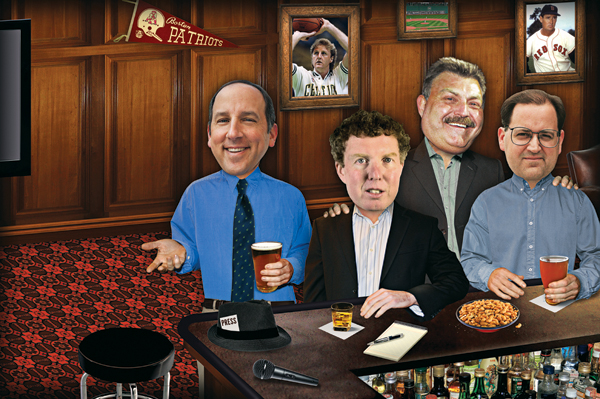Boston Sportswriters: The Fellowship of the Miserable

The Lodge, as Boston’s stuffy sports-media establishment is called, is home to such luminaries as, from left, 98.5 The Sports Hub’s Tony Massarotti, the Globe’s Dan Shaughnessy, WEEI’s Glenn Ordway, and the Globe’s Nick Cafardo. Photos by Getty Images (Shaughnessy, Ordway); Boston Globe (Cafardo); John Soares Photography (Massarotti); AP Images (Bird, Williams). (All Illustrations by John Ueland)
In late July, Red Sox first baseman Adrian Gonzalez sent the organization’s top brass a text message to complain about the team’s manager, Bobby Valentine. It was by then clear that the season was lost. Valentine had clashed with his players since spring training and, despite the team’s bloated payroll and perennially high expectations, the Red Sox looked certain to miss the playoffs for the third straight year. In response to Gonzalez’s message, two of the Sox’s owners, John Henry and Larry Lucchino, called a meeting with a handful of players to hash things out. The players, including star second baseman Dustin Pedroia, ripped Valentine behind his back. They didn’t just air a few petty grievances, they all but mutinied, declaring that they didn’t want to play for Valentine anymore.
That incident, plus several more that reflected poorly on the manager, were revealed in an explosive story published by Yahoo! Sports on August 14. Written by Jeff Passan, the article followed a June report by ESPN’s Buster Olney that called the Red Sox a “splintered group” and described the team’s clubhouse as “toxic.”
Whoever was at fault for the chaos that had descended on the team—Valentine, the players, ownership—it was clearly a massive story. Unless, that is, you happened to work as a sportswriter in Boston. While national reporters parachuted in to break a big story—as they’ve been doing with increasing frequency of late—the local press simply missed the boat. In fact, some of the Sox beat writers insisted in the aftermath of the bombshell story that Passan had gotten it all wrong. For instance, the Globe’s Nick Cafardo—who devoted so much effort to (bizarrely) defending Valentine throughout last season that he seemed to miss the larger story of a franchise crumbling around him—wrote a column arguing that what Passan’s piece showed above all else was that it was the Red Sox players rather than the manager who were the real problem. “The behavior of players as described in the Jeff Passan Yahoo! Sports story,” Cafardo wrote, “was downright disgusting.” Maybe so, but what was missing entirely from Cafardo’s take was any mention of what Valentine had done to create his own problems. Instead, Cafardo excused some of Valentine’s transgressions, including publicly questioning third baseman Kevin Youkilis’s commitment early in the season, a comment that Cafardo insisted would have been no big deal back in the ’70s and ’80s—decades that occurred, you know, 30 or 40 years ago.
Other writers simply downplayed the significance of Passan’s report altogether. Though he would later produce an article about the poor relationship between Valentine and some of his coaches, Globe Red Sox reporter Peter Abraham remains mystified as to why Passan’s story got so much attention. In journalism, it’s worth noting, there’s nothing more embarrassing than having a reporter from the outside come in and break news on your turf. “There was this perception that, well, somehow the Boston media got beat on this story,” Abraham told me. “I didn’t know what there was that we got beat on. I guess the fact that [the players and ownership] had a meeting.”
Actually, yes, exactly that.
Abraham continued: “Bobby, if anything, at the time, had his position strengthened. He didn’t get fired. They fired [the pitching coach]. And the team played better for a short time after that meeting. So when this thing came out, at least for me personally, I didn’t really know what the story was—‘Well, the Red Sox were upset three weeks ago.’”
Again, the players tried to get the manager axed. That was the story. But Abraham went on: “Had Bobby been fired, and that was the reason, it would’ve been a better story. There were really no consequences to the meeting. Nothing happened. I wasn’t really sure where to go with it.”
Abraham’s implication that the meeting was unimportant because nobody got fired is more than a bit strange, especially considering that pitching coach Bob McClure, rumored to be the source for Passan’s story, was canned less than a week after the article ran. More broadly, though, there is something seriously amiss if the Globe’s Red Sox beat writer, the holder of one of the most sought-after jobs in all of American sports journalism, doesn’t know where to go with a story like this.
But Abraham is hardly the only problem these days. The Boston sports media, once considered one of the country’s best and most influential press corps, is stumbling toward irrelevance. The national media not only seems to break more big Boston sports stories than the local press, but also often features more sophisticated analysis, especially when it comes to using advanced statistics. To put it bluntly, “The Lodge”—as Fred Toucher, cohost of the 98.5 The Sports Hub morning radio show, mockingly refers to the city’s clubby, self-important media establishment—is clogged with stale reporters, crotchety columnists, and shameless blowhards. Their canned “hot sports takes” have found a home on local television and talk radio, but do little but suck the fun out of a topic that’s supposed to be just that. And we haven’t even gotten to Dan Shaughnessy yet.
In early December, Joe Sullivan, the Globe sports editor for the past nine years, invited me to Morrissey Boulevard to discuss the state of things. Stepping into his large office, I noticed that the walls were covered with poster-size photographs of the Celtics legend Larry Bird and the champion Brockton boxer Marvelous Marvin Hagler.